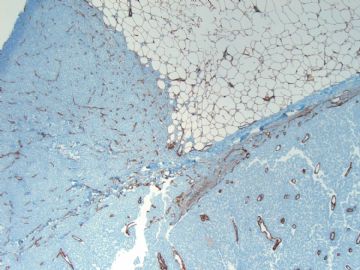| 图片: | |
|---|---|
| 名称: | |
| 描述: | |
- B1728Breast encapsulated papillary carcinoma with focal frankly invasion (cqz 4)
| 姓 名: | ××× | 性别: | 年龄: | ||
| 标本名称: | |||||
| 简要病史: | |||||
| 肉眼检查: | |||||
50-55 y/f breast lesion
Fig 1-3 H&E
Fig 4 myoepithelial stain (p63)
You dx or differential dx
-
本帖最后由 于 2009-02-17 09:45:00 编辑
相关帖子
Collagen IV stain:
I quickly reviewed the discussion above. I think most comments are very reasonable for this case.
Final diangnosis: EPC with focal frankly invasive ductal carcinoma. The photos try to demostrate the EPC with focal invasion. They do not show the EPC with high power, which make the diagnosis difficult. I discussed EPC in my case 3 and solid papillary ca in other case. Please check to see the details if you want to.
EPC can be present alone or associated with focal DCIS in the surrounding breast tissue. Sometimes frankly invasive carcinoma is present in association with EPC like this case. Mostly the invasive ca is ductal ca. In clinical practice the key question is how to report the size of invasive ca. Most people think we should report only the size of the frankly invasive component (not include the EPC part) as the tumor size for staging to avoid over treatment.
Neuroendocrine stains were negative for this case. In fact neuroendocrine positive tumors are not common.
Thank for review this case.
cqz
To 天山望月 , Abin and 197:
Thank for your analysis.
I got these photos from one of our GYN/breast fellows who took the figures for publication. I do not have high power photos. Please open the second and third H&E photos to see if there are some similarities to and difference from the photos in my third cases. Then please think about your diagnosis or differential dx. In term of discussion, differential diagnoses are very important.
In fact it is a very interesting and rare case. Wonder why so few people join the discussion. Do not know I should share with you some interesting cases or just normal or common cases. I do not know how good our pathologists' diagnostic skills are in China.

















